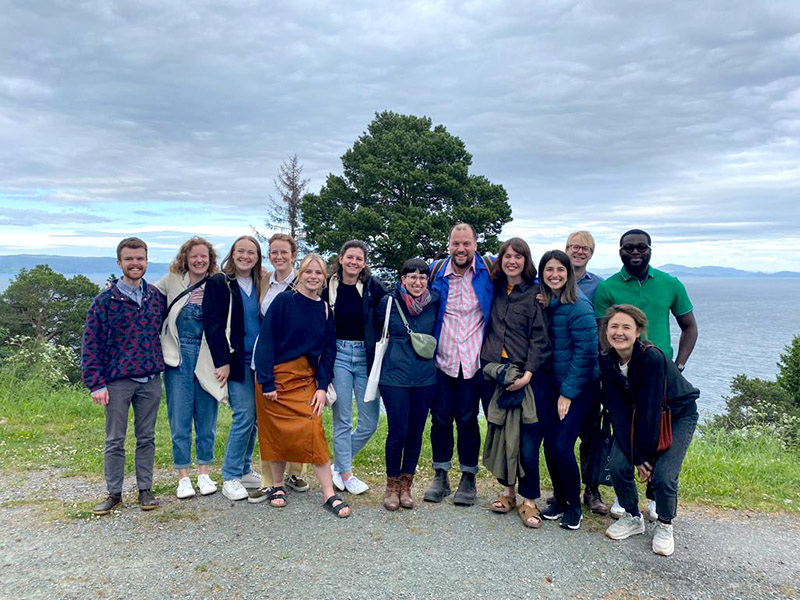
Alice Quigley reports on the course
I’m a second year PhD student exploring the role of theory and grassroots education in contemporary, UK-based social change movements. In June 2023, I attended the Community Economies Institute Summer School which took place at the Norwegian University of Science and Technology in Trondheim, Norway. It convened a group of 15 PGRs from across Europe to take a deep dive into the foundational concepts and tools that Community Economies scholars have been using to envision and enact postcapitalist economies, and explore connections with longer traditions that also value collectivity and interdependence. The course consisted of in-depth reading of core texts, short lectures by members of the CEI, seminar discussions and activities around key themes, and workshops on our research.
The Community Economies Institute is a global community of scholars, activists and artists, who are inspired by and work with the theories of J.K. Gibson-Graham, the collective moniker for the feminist geographers, Katherine Gibson and Julie Graham. Community economies literature (notably The End of Capitalism (As We Knew It) (1996) and A Postcapitalist Politics (2006)) adopts a poststructural, feminist and queer approach to economic practices, and seeks to unfix the ‘common sense’, capitalist economic identity and make visible the myriad of other economic practices people engage in day-to-day that are community-orientated, ethical and outside the market.
The discursive destabilisation of the ‘capitalocentric’ hegemony and accompanying emphasis on interdependent practices and ‘being-in-common’ (Gibson-Graham, 2006) provides a fertile landscape for radical practice without essentialism or predetermination.
As my PhD is about, in part, contemporary theories of social transformation and postcapitalism: their lineage and what they consist of at a granular level, the work of Gibson-Graham is core to my research. While there is a lot of academic writing on theories of social transformation, there is less from practitioners’ points of view: how they view and use theory, and whether it is still considered an integral and transformative tool towards social change.
In my PhD research, I aim to take a ‘practitioner’s eye view’ of the role of theory and grassroots political education and investigate how different pedagogical tactics impact affect and processes of (re)subjectification and group consciousness, and how these in turn may impact the creation of, or participation in, other social transformation activities.
The Community Economies Approach resonates strongly with me because of its focus on practice and performativity, opening up space for us to move and make change in difficult and constrained circumstances. The poststructural nature of the theory allows for shifting identities and multiple realities in what seems to be a more pragmatic and less imperial approach than what has gone before (and what we still often see today).
One aspect of Community Economies that I am currently digging into is how we conceive of scale and counter-hegemony, and how Community Economies thinks ‘with’ Gramsci in this regard – I am currently developing an article with a colleague from the Fair Creative Economies research team that explores this topic – inspired by my time, and based upon preliminary research undertaken, at the Summer School.
The Summer School was a profound and transformative experience for me and my research. While I thought that I had a good grip on the key theories from my own independent study, the Summer School provided a much deeper look both at their epistemological context and origins and how they can be practically applied to our research as tools. Taught by Katherine Gibson and Elizabeth Baron, with daily in-depth discussions in small groups, it led to a much deeper questioning and understanding.
Being with peers gave me the opportunity to share my research in a supportive environment, learn about others’ research topics and methods, and learn from those who are more ahead than I am in the PhD journey.
So much was packed in to the two week period, including a very useful seminar series that pulled in a range of contemporary scholars who were able to relate Community Economies to other topics like Degrowth and Assemblage, that it felt like a whole term squeezed into a couple of weeks.
Since leaving the Summer School, I have updated both my literature review and methodology based on my learnings, and joined the Creative Economies Research Network (CERN), a network of Creative Economics Scholars from across the world. Later this month, I will be attending their annual online conference, and I hope to develop something to present in time for next year’s conference (2024).
Alice Quigley
Email: alice.quigley@bristol.ac.uk
X / Twitter
LinkedIn
Categorised in: Student Blogs